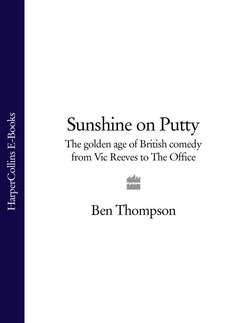Читать книгу Sunshine on Putty: The Golden Age of British Comedy from Vic Reeves to The Office - Ben Thompson, Ben Thompson - Страница 22
The amazing Let The People Sing dead cow prophecy
ОглавлениеLet The People Sing is not one of celebrated Dad’s Army fan J. B. Priestley’s better-known novels. Written to be serialized over the air by BBC radio before its first publication in book form, it was originally broadcast in instalments, beginning in early 1939 and with later episodes increasingly overshadowed by what someone on a History Channel documentary would probably refer to as ‘the darkening storm-clouds of war’.
The book’s protagonist is an out-of-work English comedian called Tommy Tiverton.42 Looking back nostalgically to the halcyon days of ‘the vast smoky-coloured caverns of the packed Empires and Palaces’, Tommy yearns for ‘a simple audience, not bedazzled by American speed, sharpness and cynicism, and blind to the richer English drollery of character’. At this stage, the threat to traditional variety is not TV, but that other little box in the corner of the front room, the radio. ‘I like my public to see me,’ Tiverton sniffs poignantly, confronted with the undeniable ascendancy of the catch-phrase-toting warriors of the wireless who will one day inspire some of Paul Whitehouse and The Fast Show team’s least amusing material.
By a set of circumstances too serpentine to go into but involving an IRA bomb and an equestrian statue, Tommy Tiverton finds himself on the run across middle England with Professor Ernst Kronak, an intellectual asylum-seeker from central Europe with a happy knack for working high-flown political and philosophical theories into day-to-day conversation. (‘In a certain limited sense all the English may be said to be anarchist,’ he observes at one point, later ascribing the relative weakness of the English revolutionary tradition to ‘this limited and natural anarchy of the national soul’.)
Priestley, who had talked about the need to shore up morale in the face of the possibility of an imminent conflict (and accordingly seems to have designed the latter stages of Let The People Sing as an explicit call to arms), already seems to be looking to the kind of country that people would want to live in afterwards. ‘Plenty of nice lads ready to go and be killed,’ someone says grimly at one point—of Britain in 1939 – ‘But…that’s being ready to die, not being ready to live.’
The book’s narrative climax hinges on the fate of an underused small-town variety hall which the snobbish local establishment want to turn into a museum (‘Too much of England, I think, is a museum,’ observes Professor Kronak, sternly) and which incoming American-based multinational United Plastics want to incorporate into their sinister mass-production facility. The debate about whether the townsfolk will stand up for their birthright of good spirits and inane singalongs in the face of this twin threat looks forward not only to the war that is about to begin,43 but also to subsequent debates about globalization and American cultural imperialism.
Things look bad for a while, but in the end the necessary stiffening of communal resolve is effected by that apparently most placid and parochial of domestic institutions: Sunday lunch. Destiny mobilizes ‘the revolutionary force of women who have spent a warmish morning in an undersized kitchen cooking a dinner they do not particularly want to eat themselves’. In these circumstances, the author notes, ‘husbands and children, like so many idiotic passengers invading the engine room, are apt to hear something unpleasant about themselves’.
When the after-effects of such savage tongue-lashings are intensified by digestive disturbance – occasioned by ‘a consignment of badly refrigerated Argentinian beef – the menfolk are finally shaken out of their complacent reverie. ‘Vast edifices of masculine sham’ are seen to crumble, and the town comes together in a patriotic fervour to defend and cherish its heritage of communal entertainment. ‘Like the nation waking from a long sleep’ is how the book’s author describes it.
